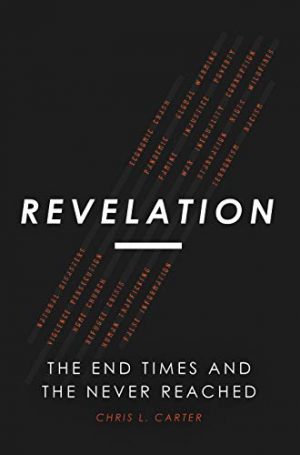The Book of Revelation is not easy to read. It is comprised of three literary genres (prophecy, apocalyptic, epistle) and uses grotesque images (dragon, beasts, prostitute, plagues, wars) to convey its message to readers, which centers around two eternal outcomes: heaven and hell. Captivated by these images and attempting to interpret their meaning, readers over the past two millennia have invented detailed scenarios about when and how the world ends.
Unfortunately, these speculations miss the eminently practical point of the book, which was addressed to churches in Asia Minor to guide them through the persecution many of them were experiencing. It is the great merit of Chris L. Carter’s Revelation: The End of Times and the Never Reached that it focuses like a laser on what John the Revelator wanted his readers — and by extension, us — to do.
For Carter, the practical point of Revelation can be stated as a question: “Will we stay committed to the mission when it will cost us our money, our homes, and our lives?” That, in various ways, was the question underlying Christ’s letters to the seven churches, which are found in chapters 2–3. But while Carter dips in and out of various chapters of the book, his focus throughout is on Revelation 7:9–12, which paints a vision of God’s preferred future for his creation and grounds the certainty of that vision in the character of God himself.
What Carter calls “A Bold Son of Victory” comes from verses 9–10. It depicts an eternal, heavenly future in which God’s people are drawn from “every nation, tribe, people and language.” God’s preferred future is the vision toward which the churches of Asia Minor, and churches throughout the world today, are called to work. The central question is whether they in their time and we in ours will stay faithful to this task in the face of the adversity that is sure to come.
What Carter calls “A Humble Song of Praise” comes from verses 11–12. In the midst of staying true to God’s preferred future, the Church experiences adversity and loss. It makes sacrifices, and sometimes gets sacrificed by the powers that be. In such times, the Church is thrust back on its faith in God. What assures the Church that the sacrifices they have made to fulfill God’s vision of one new humanity redeemed by Christ has been worth it? The very character of God, described and praised in the saints’ humble song: “Blessing and glory and wisdom and thanksgiving and honor and power and might be to our God, forever and ever!” (I’m using Carter’s translations for both songs.)
By focusing his reading of Revelation through the lens of 7:9–12, Carter puts the Church’s mission at the forefront of Christian living. Our beliefs must be true, and our lives must be pure, but if we are not working toward spreading the gospel such that the nations, tribes, people, and language groups come to God, we have fallen short of our divine calling.
I enthusiastically commend Carter’s Revelation to all Christian readers, but especially to my fellow Pentecostals of the Assemblies of God tribe. It calls us back to God’s preferred future for humanity and to our missional task. Finally, it encourages us to remain faithful regardless of the cost, for God is worthy of our work and worship.
Book Reviewed
Chris L. Carter, Revelation: The End Times and the Never Reached (Springfield, MO: Assemblies of God World Missions, 2020).
P.S. If you liked my review, please click “Helpful” on my Amazon review page.

